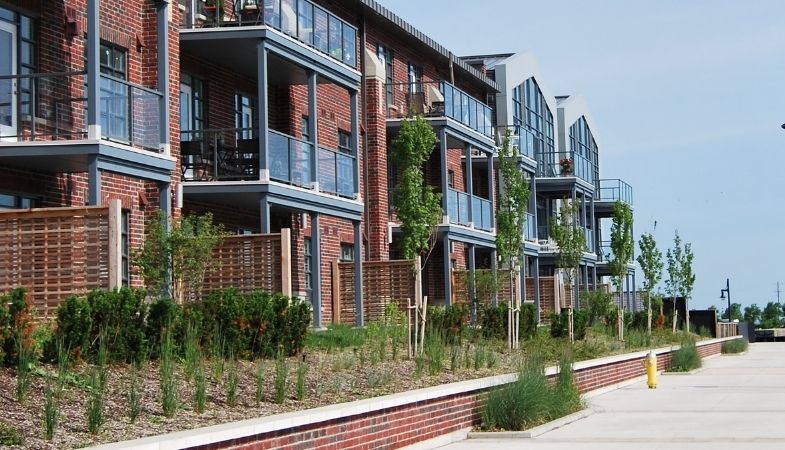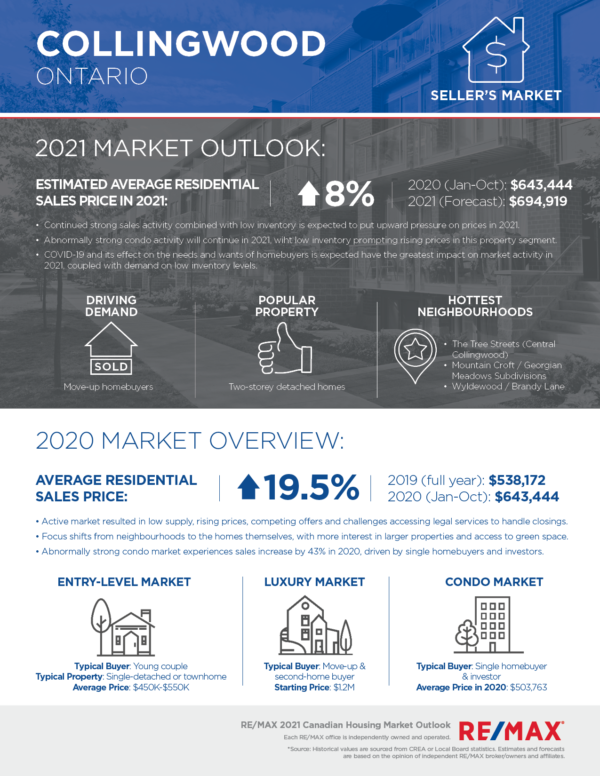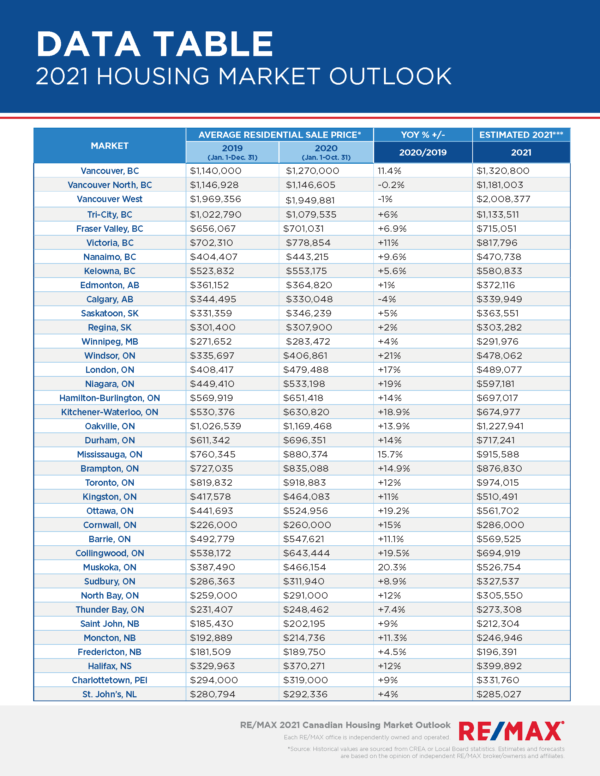
Collingwood housing market to favour sellers in 2021, prices expected to rise 8%
The Collingwood housing market was a strong seller’s market in 2020 – conditions that are expected to continue into 2021 as low inventory and rising prices continue to challenge homebuyers in the area. The housing supply shortage is a factor that’s been playing out across many Ontario housing markets, resulting in widespread rising prices. Indeed, Collingwood saw the average price of single-detached homes rise to $773,813 in 2020 (Jan. 1 – Oct. 31) compared to 2019’s average price of $607,831 (Jan. 1 – Dec. 31). Meanwhile, average condo prices also increased to $506,763 in 2020, up from $459,276 in 2019. The unusually hot 2020 condo market saw sales surpass 2019 levels by 43% by the end of October. RE/MAX expects this seller’s market to persist in 2021, with an 8% increase in average price across all property types, to $694,919, and sales expected to rise by 10%.
Collingwood currently has 2.6 months of inventory, with similar levels expected through most of 2021. Days on market are also expected to hold steady, with multiple offers on most listings expected to continue, as inventory levels lag. These conditions should carry through into 2021 and for the foreseeable future.

.
Who’s driving demand for Collingwood real estate?
It’s expected that move-up buyers will continue to drive the Collingwood housing market forward in 2021, with two-storey detached homes in greatest supply and in highest demand.
Move-up buyers in the Collingwood area – typically families – have not showed any hesitation on their part, but rather panic. The biggest obstacles to buyers in 2020 have been limited supply, rising prices, competing offers and difficulty finding a lawyer to handle their closing, thanks to the busier-than-usual market. Move-up buyers’ initial home-hunting criteria has not changed, however due to multiple-offer situations, many have had to adjust their expectations with regard to purchase price and offer conditions.
A general trend in the wake of COVID-19 has been growing interest in properties with easy access to natural amenities. As people are increasingly able and encouraged to work from home and perhaps home schooling their children, putting larger homes with offices and yards in high demand. Walkability to stores, parks, trails and proximity to Georgian Bay, Blue Mountain, and other recreational amenities have always been popular, but with the advent of a global pandemic, they are increasingly so. Prior to COVID-19, neighbourhoods were very important to Collingwood homebuyers, but due to low housing inventory and high demand, this is less of a factor now.
Looking ahead, COVID-19 and its effect on the needs and wants of homebuyers will have the greatest impact on the market in 2021, coupled with the demand on low inventory levels.
Collingwood’s condo market is stronger than usual, driven by single homebuyers and investors. Rising demand, increasing prices and declining supply have all contributed to brisk market activity in 2020. This is expected to continue into 2021, with low inventory prompting price increases.
Demand for luxury homes strengthened in Q3 and Q4 of 2020, driven by move-up buyers and second-home buyers. Rising demand and low inventory levels have impacted Collingwood’s luxury market, leading to a reduction in days on market, and upward pressure on prices. This is expected to continue into 2021, with higher-end luxury properties showing no signs of letting up. Competing offers for luxury homes are the norm, across all price ranges.
Collingwood’s hottest neighbourhoods
Collingwood’s top neighbourhoods for sales in 2020 were Wyldewood / Brandy Lane, The Tree Streets in Central Collingwood and Mountain Croft subdivision. This trend is expected to continue in 2021.
The Tree Streets in central Collingwood boasts large lots, with many older homes in the area being purchased and demolished to make way for very large, modern homes. Mountain Croft and Georgian Meadows are large subdivisions that are popular with families and have enjoyed brisk sales year-over-year. Mountain Croft has expanded in recent years, so this community is likely to see resales of the new product in 2021. There have been recent high sales with multiple offers, so it’s likely neighbours may jump in on the solid market. Georgian Meadows homes are older with larger lots than found in newer subdivisions, ideally located for ease of travel to Blue Mountain. Wyldewood / Brandy Lane condos are popular because they are newer and in close proximity to area amenities.
Canadian housing market in 2021
Canadians are on the move. RE/MAX isn’t calling this an “exodus,” but the re-location trend across the Canadian housing market is real, and it’s just one focus of the RE/MAX 2021 Housing Market Outlook Report. RE/MAX Canada anticipates healthy housing price growth at the national level, with move-up and move-over buyers continuing to drive activity in many regions across the Canadian housing market. An ongoing and widespread housing supply shortage is likely to continue, presenting challenges for homebuyers and putting upward pressure on prices.
Due to these factors, the 2021 RE/MAX 2021 outlook for average residential prices is an estimate of +4% to +6% nation-wide. Here’s the regional break-down:

.
Additional report findings include:
- 35% of RE/MAX brokers indicate that “move-over” buyers from other cities and provinces will continue to spark market activity in 2021
- 45% of RE/MAX brokers indicate that move-up buyers will likely be a primary driver of the housing market demand in 2021
- Half of Canadians (53%) are confident that Canada’s housing markets will remain steady in 2021
- 52% of Canadians believe real estate will remain one of the best investment options in 2021
“We’ve seen a lot of anecdotal evidence since the summer that households are considering significant lifestyle changes by relocating to less-dense cities and neighbourhoods,” says Christopher Alexander, Executive Vice President and Regional Director, RE/MAX of Ontario-Atlantic Canada. “This has sparked unprecedented sales this year in suburban and rural parts of Canada and we expect this trend to continue in 2021.”
.
2022-11-29 06:01:43
Source link



